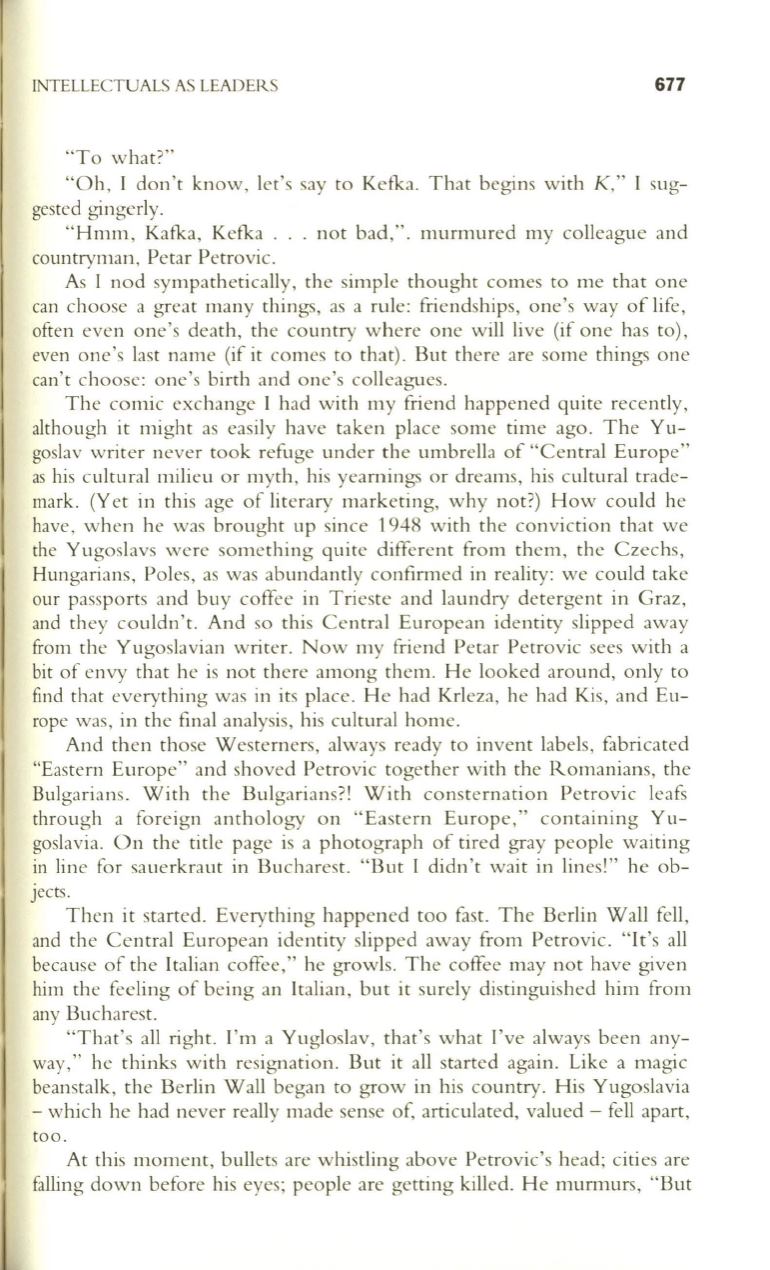
INTELLECTUALS AS LEADERS
677
"To w hat?"
"Oh , I don ' t know, let's say to Kefk a. T hat begins with
K ,"
I sug–
gested ginge rly.
" Hmm , Kafk a, Kefk a ... no t bad ,". murmured my co ll eague and
countryman , Petar Petrovic.
As I nod sympath eti ca lly, the simple thought comes to me that o ne
can choose a grea t many thin gs, as a rul e: fri endships, one's way o f life,
often even o ne's death , the country where o ne w ill li ve (if one has to),
even o ne's last name (i f it comes to that). But there are some things one
can't choose: o ne 's birth and o ne's coll eagues .
T he comi c exchange I had with my fri end happened quite recently,
altho ugh it mi ght as easily have taken place some time ago. The Yu–
goslav w riter never took refu ge under the umbrella of "Central Europe"
as his cultural mili eu o r myth , hi s yea rnings or dreams, his cultural trade–
mark. (Yet in thi s age o f literary marketing, w hy no t?) How could he
have, when he was bro ught up since
1948
w ith the convicti on that we
the Yugoslavs were somethin g quite different from them , the Czechs,
Hunga ri ans, Poles, as was abundantly confirmed in reality: we could take
our passpo rts and bu y coffee in Trieste and laundry detergent in G raz,
and they couldn 't. And so thi s Central Europea n identity slipped away
from th e Yugoslavian writer. N ow my fri end Petar Petrovic sees with a
bit of envy that he is no t there amo ng them . He looked aro und, only to
find that everything was in its place . He had Krl eza, he had Kis, and Eu–
rope was, in the fin al analysis, hi s cultural home.
And then th ose W esterners, always ready to invent labels, fabricated
"Eastern Europe" and shoved Petrovic together with th e R omanians, the
Bulga ri ans. With th e Bulga ri ans? ! With consternati o n Petrovic leafs
throu gh a fo reign anth o logy o n " Eastern Europe," co ntaining Yu–
goslav ia. On the titl e page is a pho tog raph of tired gray people wa iting
in line fo r sa uerkraut in Bu charest. "But I didn 't wait in lines !" he ob–
jects.
T hen it started . Everything happened too fas t. The Berlin W all fell ,
and th e Central European identity slipped away from Petrovic. " It 's all
because o f the Italian coffee," he growl s. The coffee may no t have given
him the feeling of being an Italian , but it surely distinguished him from
any Bucharest.
"That's all ri ght. I'm a Yugloslav , that's what I've always been any–
way," he thinks with res ignati o n. But it all started again . Like a magic
beanstalk , th e Berlin W all began to grow in hi s country. His Yugoslavia
- whi ch he had neve r really made sense of, arti culated , valued - fell apart ,
too.
At thi s moment , bullets are whistling above Petrovi c's head ; citi es are
falling down befo re his eyes; people are getting kill ed. H e murmurs, "But


